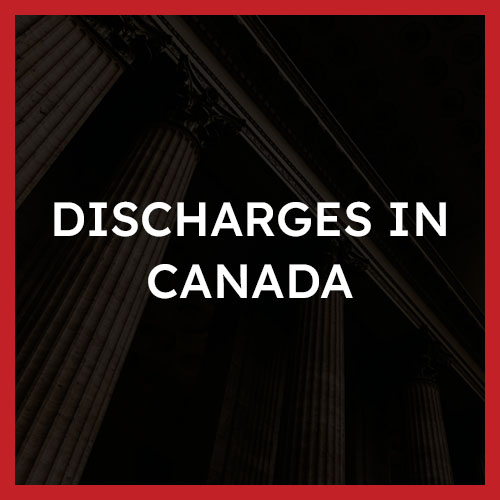What is a conditional discharge?

As a sentence, a conditional discharge will require that you admit to the facts of the offence and that you comply with a set of conditions for a specified period of time. The conditions that accompany this type of discharge may range between 6 months to 2 years. Some examples of conditions that typically accompany a conditional discharge include keep the peace and be of good behaviour, remain within the jurisdiction of the court, perform community service, report to a probation officer, and will often include a weapons or firearms prohibition. If you successfully comply with the conditions stipulated by the court for the specified amount of time, you will be permanently discharged from the offence.
If you fail to to comply with the conditions ordered by the court, you can receive a new criminal charge for breaching probation or for failing to comply with a court order. Importantly, if you fail to comply with the terms of your discharge, the discharge can be revoked and you can be convicted of the original offence. If convicted of the original offence, you will not only receive a criminal record, but may be subject to a harsher sentence or penalty.
Who Can Get A Conditional Discharge
Because a conditional discharge is considered to be a special or extraordinary sentencing measure, it can only be granted for eligible offences and will only be granted when the judge hearing the application is of the view that the discharge is in your interests and the interests of the public.
You will not be eligible for a conditional discharge if you have been charged with an offence that carries a minimum sentence in the event of conviction. For example, some drug offences and sexual offences involving minors have a minimum sentence of one year of imprisonment following a finding of guilt. For these sentences, no discharge would be available. Further, a discharge is not available for offences where the sentence exceeds a maximum of 14 years spent in prison. This would include very serious offences like robbery or murder.
How To Get A Conditional Discharge
To get a conditional discharge, you will first have to plead guilty to an eligible offence or be convicted of an eligible offence. Once a plea or finding of guilt has been entered, you will need to go before a judge and present substantive submissions in support of your discharge. The main goal of these submissions is to successfully demonstrate that a discharge is in your best interests as well as the interests of the public. When making an application for a conditional discharge, the following key points are generally addressed:
- The seriousness and nature of the offence. The more serious or harmful, the more difficult it will be to obtain a discharge.
- The prevalence of the offence in the community. If the offence is extremely prevalent, it may increase the importance of imposing a harsher sentence to act as a deterrent to further, similar offences and reduce the likelihood of a discharge.
- If you stood to personally gain from the offence. If you took advantage of other people for personal gain when committing the offence, the likelihood of obtaining a discharge will be reduced.
- The value of property if any was damaged during the offence. The more valuable the property, the more serious the crime.
- Whether it was a crime driven by impulse. If you invested a significant amount of time in planning the offence and the offence was highly calculated, it will reduce your chances of getting a discharge.
Generally speaking, a discharge will always be in your best interests, but the court will be less inclined to grant you a conditional discharge if you have previously and recently been convicted of a criminal offence. Typically, the court will be more inclined to grant a discharge to an individual who is of good character and reputation and who has no criminal record.
When considering whether it is in the best interest of the public for you to receive a discharge, the court will consider whether there is value in making your conviction a part of the public record. Generally it will be of value to the court to make your conviction public when it is necessary to protect members of the public, or when a harsher punishment is necessary to deter others from copying your behaviour. This is often the case with crimes such as trust theft, fraud, or some other offence where you took advantage of someone else’s vulnerability for your own gain. After committing these types of offences, the court will often be of the view that employers and professional associations should have the right to know about your prior criminal activities before hiring you.
Alternatively, the court could be of the view that you should receive a criminal record and a harsher punishment than a discharge for deterrence purposes. That is, perhaps due to the serious nature of the offence or due to the sheer prevalence of the offence, the court might find that you should receive a more severe punishment to send a message to the public and to deter others from committing a similar offence.
About The Author






